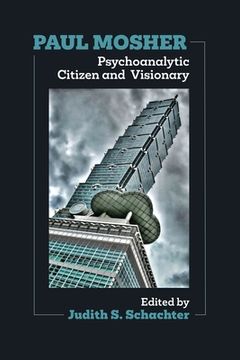Reseña del libro "Paul Mosher: Psychoanalytic Citizen and Visionary (en Inglés)"
This book honors Paul Mosher and preserves for history the man and the work that he did to transform American psychoanalysis for the 21st century. It contains Paul's Civics Lessons, his amicus brief in the Jaffee Redmond case, his influential paper with Arnold Richards on membership and certification and other samples of his work. Paul's lifelong interest in technology and his keen scientific mind were instrumental in bringing psychoanalysts into the computer age. His knowledge and his proposal to digitize the entire psychoanalytic literature brought about PEP, which made that literature available with a stroke of a finger, and this book also tells that story. In his own words, Paul relates fascinating episodes from his childhood that shaped his life and work, his experience with LSD, and the development of his interest in computers. Important personal reminiscences by friends and colleagues augment Paul's story, and explain how his participation brought about his extraordinary influence on the evolution of APsaA's governance and its finances. It also includes several beautiful examples of his photographic and design artistry.New to us all is the fragment of autobiography he'd embarked on as his health was failing, meant for his five grandchildren. In it he details that through his physician father he was privy to the corruption of the local police department and predisposed to a clear ethical code and a fine nose for corruption. A cartoon he shared shows businessmen around a table, one stating, "let's draw a clear ethical line and then see how close we can get to it." Jeffrey Berman's description of their work together on "Confidentiality " and the two books about psychiatric transgressions indicates how central to his identity was his moral core.His childhood hospitalizations led to a life of scrupulous exercising, as well as careful financial planning after a doctor warned him that he'd be a cripple in his 50's. While Harvard doesn't play a large role in the autobiography, he was proud of his frequently still referenced cardiology paper, his licensed stint on the radio station and his home for four years, Dunster House. All remained close to his heart. The transition to psychoanalytic education was not smooth; his formidable aunt by marriage, Henriette Klein, warned him that his relentless questioning made a comfortable career in New York unlikely and he, by then married to Paula, moved back to Albany, to establish a successful psychoanalytic practice in a charming small private office near the medical center and the state law library. He raised his family in a secluded house on a pond far from the city where he, from Apple II days on, began to create and sell software programs, maintain his many computers and continue to learn new computer languages.The hierarchical rigidities visible at psychoanalytic meetings and the chaos he observed in organizational functioning led him to frequent the law library and research the NY State Not-for-Profit Corporation Law and join with others who were committed to creating change in APsaA governance. Despite his planned retreat from psychoanalytic battles, he became the intellectual engine of this struggle through his Civics Lessons, published online, that enabled him to reach and inform the membership and undergird organizational change.

